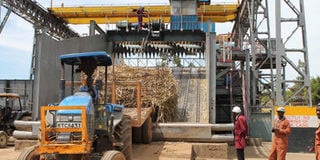Why private sugar factories are doing better

Cane milling at Butali Sugar Mills in Kakamega. PHOTO | FILE | NATION MEDIA GROUP
What you need to know:
- The private millers have managed to sustain operations amid a scramble for the primary raw material in the region.
Out of 14 licensed millers, eight are privately owned and spread out across Western Kenya, Nyando, South Nyanza and Coast sugar belts.
In stark contrast to their State-owned counterparts, private millers in the sugar belt have surmounted huge hurdles to tighten their grip on the country’s market.
Other than efficient management and strong financial muscle, private millers boast of new machines that are serviced regularly, helping them produce efficiently and optimally.
A properly functioning machine is expected to produce 10 tonnes of sugar for every 100 tonnes of raw material delivered.
Out of 14 licensed millers, eight are privately owned and spread out across Western Kenya, Nyando, South Nyanza and Coast sugar belts.
The companies include Kibos, West Kenya, Sukari, Olepito, Busia Butali, Transmara and Kwale.
The private millers have managed to sustain operations amid a scramble for the primary raw material in the region.
Kibos Sugar and Allied Industries Ltd, which operates in Kisumu, Siaya, Nandi, Kakamega and Kericho counties, has a capacity to mill 3,500 TCD.
It boasts of 5,000 acres of nucleus farms under cane and has contracted farmers who own more than 100,000 acres to sustain its capacity.
OPTIMUM PERFORMANCE
According to managing director Bhire Chatthe, the Kibos factories are maintained annually by experts from the equipment supplier to ensure optimum performance.
In Kakamega, West Kenya Sugar Company and the neighbouring Butali Sugar Mills have been sourcing cane from farmers in Bungoma, Nandi, Uasin Gishu and parts of Nyanza to sustain their operations.
Olepito Sugar and Busia Sugar Company operate within Busia County. But there have been accusations that some of the privately run millers are not investing in cane development.
Instead, the accusations go, they have been taking advantage of the difficulties facing state-owned millers to sustain their operations by approaching contracted farmers and harvesting their cane.
In Busia, farmers complained about sugar millers crossing into neighbouring Uganda in search of raw materials at cheaper prices while abandoning local growers.
The millers were reported to be buying the cane at Sh2,000 per tonne, compared to Sh3,700 per tonne locally.
This has contributed to apathy among farmers to expand cane production.
The government has since banned the importation of cane. This has jolted operations at Busia Sugar Company, forcing it to scale down production.
The miller said it had been importing cane from Uganda to fill the gap created by the local supply shortages.
MAKING LOSSES
Mr Mohammed Omar Bajaber, the administrator of the miller, explained that the cane the miller had developed was destroyed in the farms when the factory was facing uncertainty over its operations due to court cases, which had been filed to block the miller from operating.
Mr Ibrahim Juma, the national chairman of the Kenya National Federation of Sugarcane Farmers (KNFSF) said the millers should give priority to local farmers to cushion them from making losses.
“We have no problem with sugar millers crossing into Uganda to source for raw material as long as they ensure cane belonging to our farmers is harvested and they are paid within seven days,” said Mr Juma.
West Kenya, which processes the Kabras brand, has for long held position one in both production and sugar sales, controlling nearly a third of the market share.
Transmara sugar was reported to sell 37,545 tonnes of the sweetener, Kibos (42,565) and Busia factory 14,341.
Reported by Benson Amadala, Victor Raballa and Caroline Wafula




